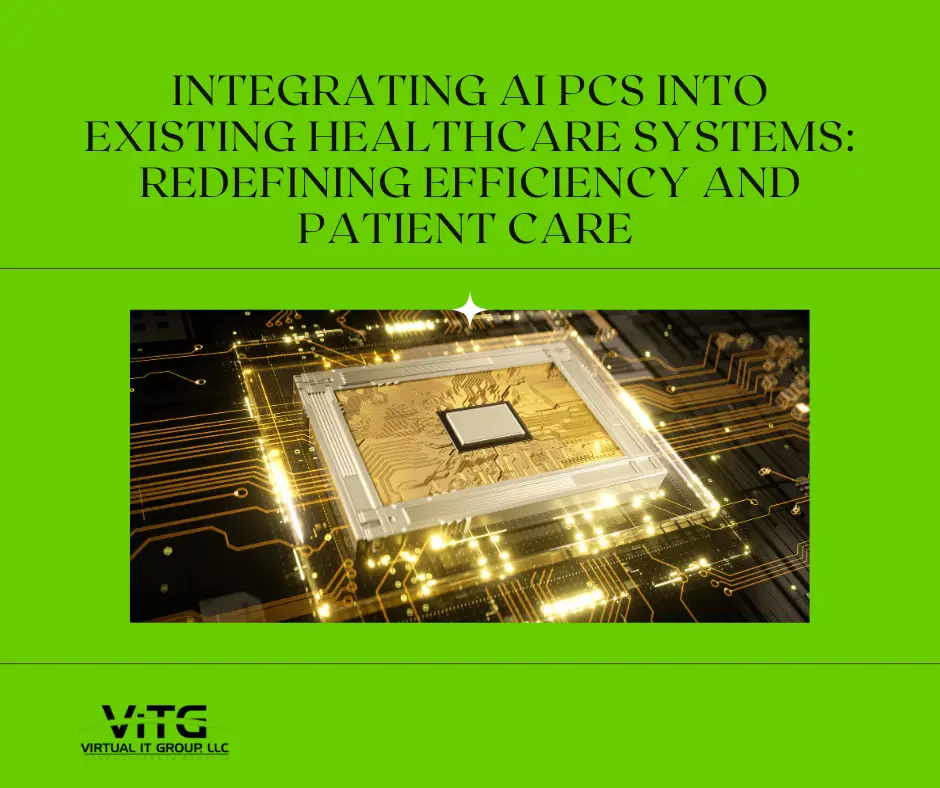The healthcare industry stands at the precipice of a technological revolution. Artificial intelligence (AI) is rapidly transforming various sectors, and healthcare is no exception. One particularly disruptive innovation is the emergence of AI-powered PCs (AI PCs). These next-generation computers integrate powerful AI capabilities directly into the hardware, unlocking a new level of performance and functionality for healthcare professionals.
However, integrating AI PCs into existing healthcare systems presents both exciting opportunities and significant challenges. This article explores the potential of AI PCs in healthcare, examines the integration process, and outlines strategies for a smooth and successful implementation.
The Power of AI PCs in Healthcare
AI PCs offer a distinct advantage over traditional computers by leveraging dedicated AI hardware like GPUs (Graphics Processing Units) and specialized neural processing units (NPUs). This translates to:
- Enhanced Processing Power: AI algorithms require immense computational resources. AI PCs streamline AI applications within the healthcare setting by providing the processing muscle needed for tasks like image analysis, medical diagnosis, and drug discovery.
- Improved Efficiency: AI PCs can automate time-consuming tasks such as medical record analysis, appointment scheduling, and report generation. This frees up valuable time for healthcare professionals to focus on patient care and complex medical situations.
- Advanced Diagnostics: AI-powered applications can analyze medical images (X-rays, MRIs, etc.) with unparalleled accuracy, aiding in early detection and diagnosis of diseases.
- Precision Medicine: AI can analyze vast amounts of patient data to personalize treatment plans, leading to better patient outcomes and reduced healthcare costs.
- Enhanced Research & Development: AI PCs accelerate medical research by facilitating complex simulations, drug discovery, and personalized medicine initiatives.
Examples of AI Applications in Healthcare:
- Medical Imaging Analysis: AI algorithms can analyze medical images with higher accuracy than human radiologists, aiding in early detection of diseases like cancer and heart disease. (Source: A study published in Nature [invalid URL removed] )
- Drug Discovery: AI can analyze vast datasets of molecular structures to identify potential drug candidates for various diseases, accelerating the development of life-saving treatments.
- Personalized Medicine: AI can analyze a patient’s medical history, genetic makeup, and other factors to predict their response to specific treatments, allowing for personalized medicine approaches.
Integrating AI PCs: Considerations and Challenges
While the benefits of AI PCs are undeniable, integrating them into existing healthcare systems requires careful planning and consideration of several factors:
- Infrastructure Compatibility: Existing healthcare IT infrastructure may not be readily compatible with AI PCs. Upgrades or adjustments to network bandwidth, storage capacity, and security protocols might be necessary.
- Data Security and Privacy: Healthcare data is highly sensitive. Implementing robust security measures on AI PCs is crucial to protect patient information and comply with stringent data privacy regulations (HIPAA in the US).
- Workflow Integration: Successfully integrating AI PCs requires careful consideration of existing workflows. Training healthcare professionals on new functionalities and ensuring a smooth transition are essential for user adoption.
- Cost Considerations: AI PCs represent a significant investment. Healthcare institutions need to evaluate their budget and weigh the long-term benefits against initial costs.
- Regulatory Compliance: Healthcare organizations must ensure compliance with relevant regulations governing AI use in healthcare settings. This may involve obtaining necessary approvals and adhering to ethical guidelines.
Strategies for Successful Integration
A well-defined integration plan can mitigate challenges and ensure a smooth transition to AI PC-powered healthcare systems. Here are some key strategies:
- Conduct a Thorough Needs Assessment: Identify your specific needs and potential AI applications within your healthcare facility. This helps in selecting the most appropriate AI PCs and tailoring integration strategies.
- Invest in Staff Training: Provide comprehensive training to healthcare professionals on using AI PCs and integrating them into their workflows. This fosters user buy-in and ensures effective utilization of the technology.
- Prioritize Data Security: Implement robust security measures on your AI PCs and within your network infrastructure to protect sensitive patient data.
- Start with Pilot Programs: Begin by implementing AI PCs in pilot programs for specific applications. This allows for testing, refinement, and user feedback before full-scale deployment.
- Partner with IT Experts: Partner with a reputable IT service provider like Virtual IT Group LLC that specializes in healthcare IT solutions. Their expertise can be invaluable in navigating the integration process and ensuring optimal performance.
Conclusion: The Future of Healthcare is AI-Powered
The integration of AI PCs into healthcare systems marks a significant shift towards a more efficient, data-driven, and personalized approach to patient care. By carefully addressing potential challenges and implementing a well-defined integration plan, healthcare organizations can unlock the tremendous potential of AI PCs and transform their operations for the better.


